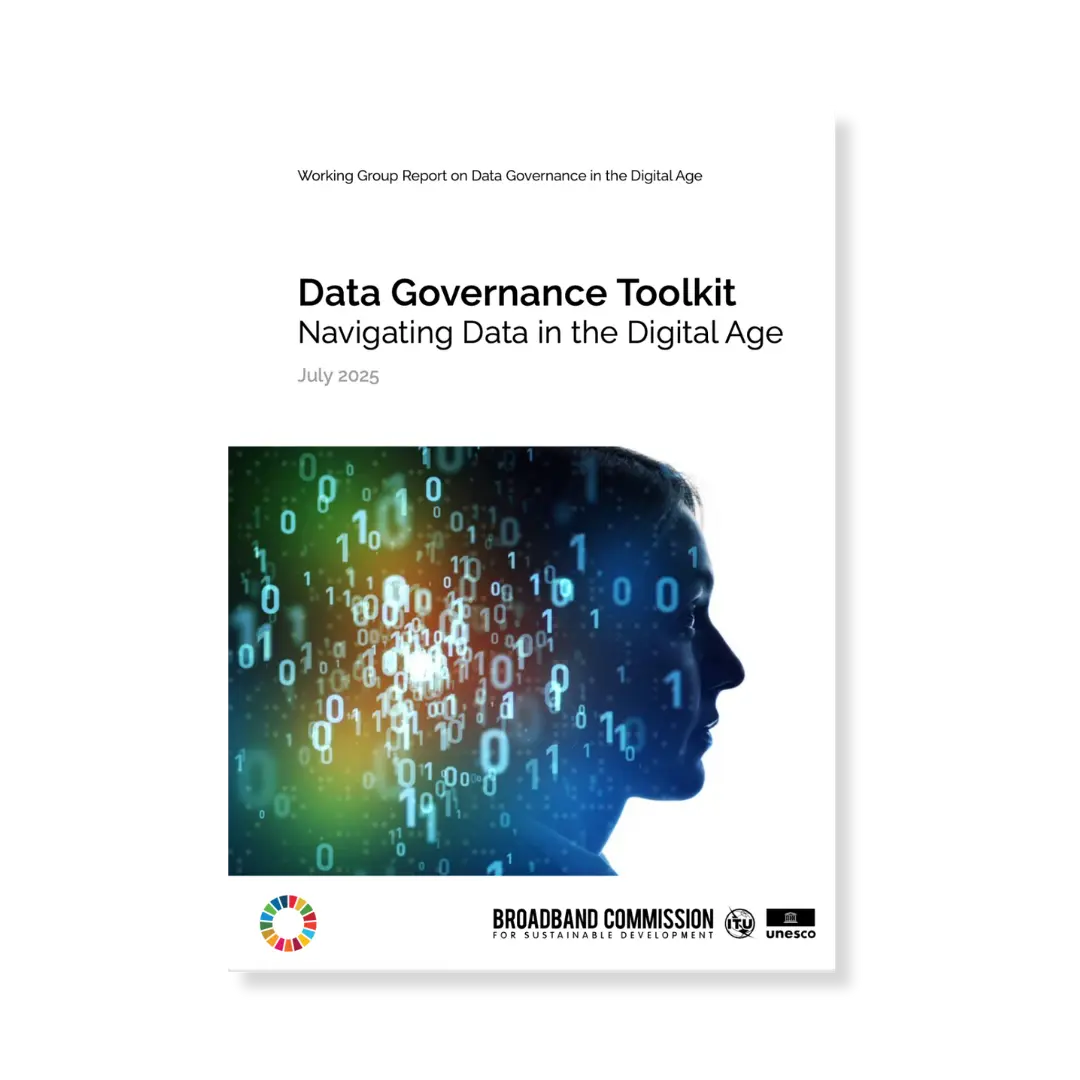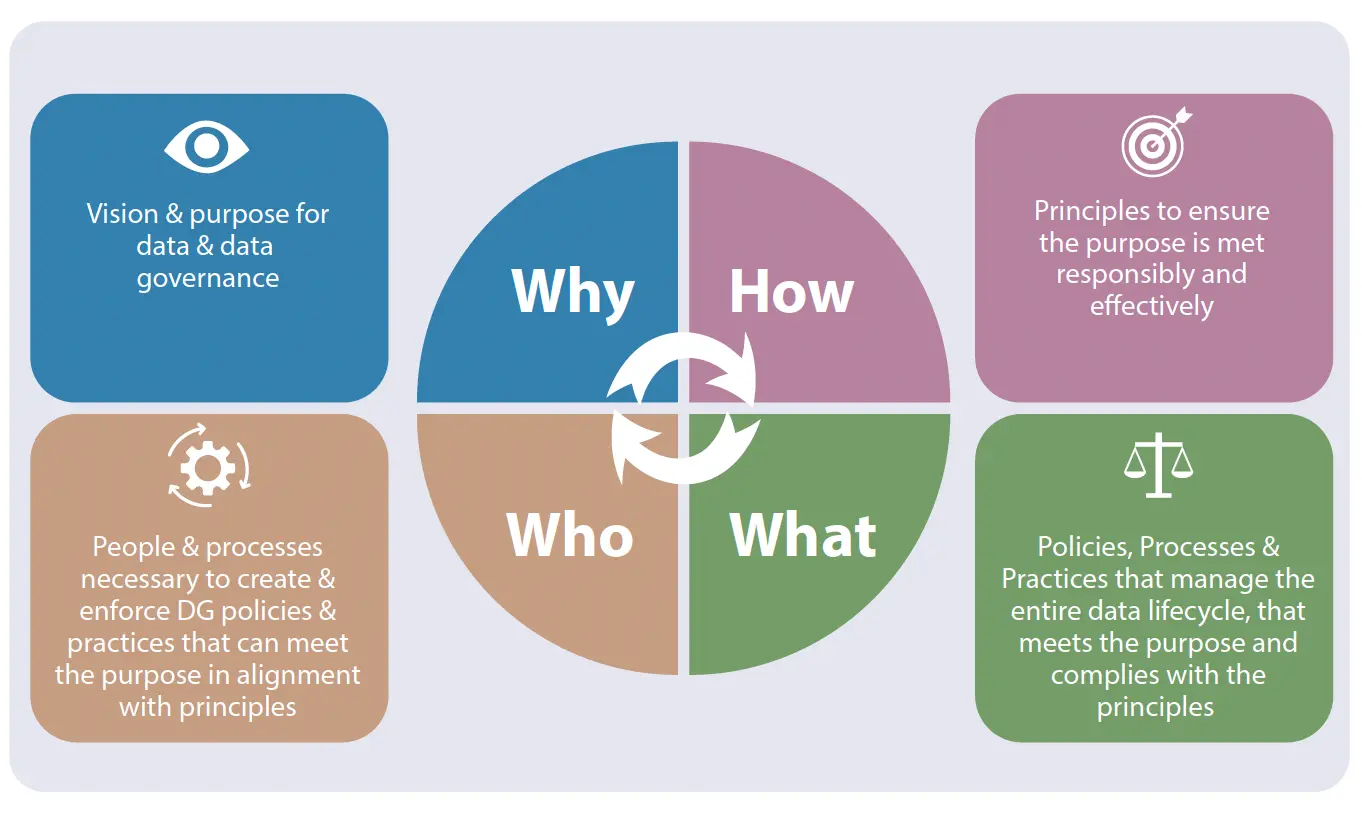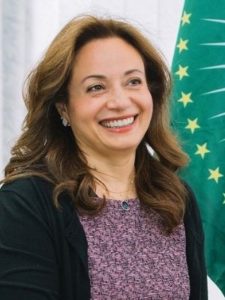How can governments promote sustainable development through effective, inclusive, and future-proof data governance?
The Broadband Commission Working Group on Data Governance in the Digital Age was launched to advance inclusive, interoperable, and future-ready data governance frameworks that respond to the challenges and opportunities of today’s digital transformation. Co-chaired by UNESCO, UNDP, ITU, and the African Union Commission, the Working Group brings together governments, international organizations, industry leaders, and civil society to promote rights-based data governance that empowers individuals and supports sustainable development.
Its 2025 outcome, the Data Governance Toolkit: Navigating Data in the Digital Age, provides practical guidance for policymakers navigating data regulation, cross-border flows, and responsible data use in the era of AI and emerging technologies.
Explore the toolkit

Built through a multistakeholder process led by UNESCO, UNDP, ITU, and the African Union Commission, the Data Governance Toolkit: Navigating Data in the Digital Age offers:
- Practical guidance for policymakers
- Tools to address AI and emerging data challenges
- Flexible frameworks for inclusive, rights-based governance
- Resources to support national strategies and capacity-building
Setting the stage
In today’s fast-evolving digital age, data has become a foundational asset — powering economic development, innovation, public service delivery, and social transformation. Yet without effective governance, data’s potential can quickly give way to risks: privacy breaches, algorithmic bias, security threats, and deepening digital divides. The lack of coherent, rights-based, and interoperable data governance frameworks hinders cross-border collaboration, impairs trust, and limits equitable access to data-driven opportunities, particularly for low- and middle-income countries (LMICs).
To address this urgent global challenge, the Broadband Commission Working Group on Data Governance has developed the Data Governance Toolkit: Navigating Data in the Digital Age, to be officially launched at the WSIS+20 High-Level Forum on 8 July 2025 in Geneva. Co-chaired by UNESCO, UNDP, ITU, and the African Union Commission, the Toolkit serves as a practical, capacity-building resource for policymakers, regulators, and governments. It offers actionable guidance on key data governance priorities — including legal frameworks, institutional roles, cross-border data flows, digital self-determination, and data for AI.
As a key capacity building resource, the Toolkit aims to empower policymakers, regulators and data practitioners to navigate the complexities of data governance in the digital era. Plans are currently underway to translate the Toolkit into French, Spanish, Chinese, and Arabic to ensure broader global accessibility and impact. Pilot implementation at country level is also being explored for Q4 2025 to support national-level uptake.
The Data Governance Toolkit
The Data Governance Toolkit: Navigating Data in the Digital Age offers a practical, rights-based guide to help governments, institutions, and stakeholders make data work for all.
The Toolkit is organized around four foundational data governance components—referred to as the 4Ps of Data Governance:
- Why (Purpose): How to define a vision and purpose for data governance in the context of AI, digital transformation, and sustainable development.
- How (Principles): What principles should guide a governance framework to balance innovation, security, and ethical considerations.
- Who (People and Processes): Identifying the stakeholders, institutions, and processes required to build and enforce responsible governance structures.
- What (Practices and Mechanisms): Policies and best practices to manage data across its entire lifecycle while ensuring privacy, interoperability, and regulatory compliance.

The Toolkit also includes:
- A self-assessment framework to help organizations evaluate their current capabilities;
- A glossary of key terms to foster shared understanding;
- A curated list of other toolkits and frameworks for deeper engagement.
Designed to be adaptable across regions and sectors, the Data Governance Toolkit is not a one-size-fits-all manual—but a modular resource to guide smarter, safer, and fairer data use in the digital age.
The Working Group Model
Composition and Activities

Ms. Audrey Azoulay
Director-General of UNESCO

Ms. Doreen Bogdan-Martin
Secretary-General of ITU

Achim Steiner
[Former] Administrator, UNDP

H.E. Dr. Amani Abou-Zeid
[Former] Commissioner for Infrastructure and Energy,
the African Union Commission
- Baroness Beeban Kidron, 5Rights Foundation
- HE Deemah Al Yahya, Digital Cooperation Organization
- Dr. Hessa Al Jaber, Es’Hailsat
- Mr Piotr Dmochowski-Lipski, EUTELSTAT IGO
- Dr Qu Dongyu, Food and Agriculture Organization (FAO)
- [Former Commissioner] H.E Jessica Rosenworcel, Federal Communications Commission
- [Former Commissioner] Mr Mats Granryd, Global System for Mobile Communications Association (GSMA)
- Dr Rumman Chowdhury, Humane Intelligence
- Mr Chuen Hong Lew, Infocomm Media Development Authority, Singapore
- Ms Pamela Coke-Hamilton, International Trade Centre
- Mr Lacina Koné, Smart Africa
- H.E Engineer Majed Al Mesmar, Telecommunications and Digital Government Regulatory Authority, United Arab Emirates
- Ms Sima Sami Bahous, UN Women
- Mr Filippo Grandi, United Nations High Commissioner for Refugees
- Mr. Ziyang Xu, ZTE
- Dr Stefaan Verhulst, The Governance Lab and The Data Tank
- Dr Jennifer Prendki, Quantum of Data
- Dr Lucie-Aimée Kaffee, Hugging Face
- Mr. Bart Rousseau, Digital Flanders
Focus Area
Resources
Broadband Advocacy Targets
SDGs
Relevant activities
The Broadband Commission Working Group on Data Governance in the Digital Age was established in June 2024, proposed by UNESCO, and is co-chaired by UNDP, ITU, and the African Union Commission. The Working Group brings together a diverse coalition of stakeholders — including governments, international organizations, private sector actors, and civil society — to support the development of responsible, interoperable, and future-ready data governance policies.
The initiative has benefitted from strong engagement with a wide range of global partners, including Smart Africa, GSMA, Singapore’s Infocomm Media Development Authority (IMDA), UNHCR, 5Rights, International Trade Centre (ITC), and others. Through ongoing multistakeholder consultations held across Southeast Asia, the Middle East, Latin America, and Africa, the Working Group has sought to ensure that local needs and perspectives are reflected in global data governance frameworks.
The key outcome of the Working Group is the Data Governance Toolkit: Navigating the Digital Age — a practical resource to guide policymakers and regulators in building inclusive and resilient data systems. The Toolkit was previewed during the UNESCO Conference on Capacity Building for AI and Digital Transformation in the Public Sector (June 2025), where it was spotlighted as a key effort to strengthen data governance capacity worldwide.
Articles and additional resources
- UNESCO Data Governance webpage: Data Governance in the Digital Age | UNESCO
- UNESCO news article on Consultation with Arab States: UNESCO convened consultation on data governance to promote inclusive digital policy frameworks Data Governance in the Digital Age | UNESCO
- UNESCO news article on Consultation African countries: UNESCO, African Union and Smart Africa convene consultations with African stakeholders to promote inclusive data governance | UNESCO
- UNESCO news article on June conference: Data Governance spotlight at the UNESCO Conference on Capacity Building for AI and Digital Transformation in the Public Sector | UNESCO






